2018年杭州市中考英语试题及答案
2018年浙江省中考英语真题(写作题)

2018年浙江省中考英语真题(写作题)一、写作题(共8题;共40分)1.如今,国内外很多孩子在父母的安排下没有了自己的周末,如下图中的Jack。
请分析图中的这种现象并谈谈你的看法,以Weekend or Not?为题写一篇约110词的英语短文向Parents杂志投稿,让父母们通过阅读你的文章能有所启发。
注意:文中若出现“Jack"以外的人名或任何学校名称,该作文得分不超过12分。
Weekend or Not?2.你校英语社团正在开展主题为"How do students find study partners?"的讨论,为此你采访了一些学生。
请你根据下表内容用英语写一篇短文进行交流,并说明你自己的方式及理由。
方式理由部分学生使用网络部分学生参加社团方便找到学伴及时得到帮助面对面分享经验共同解决问题你…………注意:①短文必须包括表中所有内容,可适当增加细节;②你的理由至少两条;③词数:80--100;④短文首句仅供选择使用,不计入总词数。
参考词汇:学伴study partner方便的convenient短文首句:I have recently done a survey about how students find study partners.3.假设你是Li Hua,以下是你的美国笔友Alex发给你的一封电子邮件,谢你根据该邮件内容给A lex回一封邮件。
金要求:①考生需按电子邮件格式完成整封邮件;②邮件中不能出现真实姓名、校名等相关信息;③字数90—110。
4.(2018·华)在即将举行的中学生国际文化交流活动中,你将代表学校介绍中国的传统节日,请你从所给的卡片中任选一张,用英语写一篇发言稿,介绍该节日。
注意:①发言稿中必须包含卡片上的信息,并适当发挥;②文中不得出现真实姓名、学校等信息;③词数80~100;④文章的开头和结尾已给出,不计入总词数。
Ladies and gentlemen,Welcome to the Chinese culture tour.That's all.Thanks for listening.5.今年5月11日,你校组织了一次社会实践活动,部分学生选择去了红星农场(见导图一),其余学生选择去了科技博物馆(见导图二)。
(完整版)2018年杭州市中考英语真题及答案
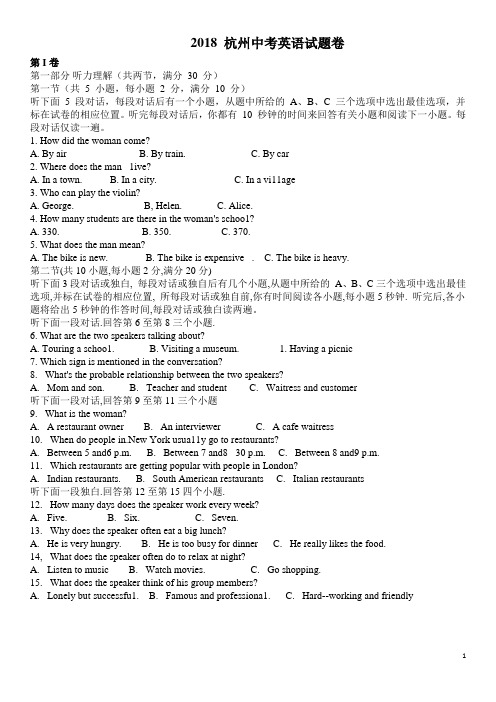
2018 杭州中考英语试题卷第I卷第一部分听力理解(共两节,满分30 分)第一节(共 5 小题,每小题 2 分,满分10 分)听下面 5 段对话,每段对话后有一个小题,从题中所给的A、B、C 三个选项中选出最佳选项,并标在试卷的相应位置。
听完每段对话后,你都有10 秒钟的时间来回答有关小题和阅读下一小题。
每段对话仅读一遍。
1. How did the woman come?A. By airB. By train.C. By car2. Where does the man 1ive?A. In a town.B. In a city.C. In a vi11age3. Who can play the violin?A. George. B, Helen. C. Alice.4. How many students are there in the woman's schoo1?A. 330.B. 350.C. 370.5. What does the man mean?A. The bike is new.B. The bike is expensive .C. The bike is heavy.第二节(共10小题,每小题2分,满分20分)听下面3段对话或独白, 每段对话或独自后有几个小題,从题中所给的A、B、C三个选项中选出最佳选项,并标在试卷的相应位置, 所每段对话或独自前,你有时间阅读各小题,每小题5秒钟. 听完后,各小题将给出5秒钟的作答时间,每段对话或独白读两遍。
听下面一段对话.回答第6至第8三个小题.6. What are the two speakers talking about?A. Touring a schoo1.B. Visiting a museum. 1. Having a picnic7. Which sign is mentioned in the conversation?8. What's the probable relationship between the two speakers?A. Mom and son.B. Teacher and studentC. Waitress and customer听下面一段对话,回答第9至第11三个小题9. What is the woman?A. A restaurant ownerB. An interviewerC. A cafe waitress10. When do people in.New York usua11y go to restaurants?A. Between 5 and6 p.m.B. Between 7 and8 30 p.m.C. Between 8 and9 p.m.11. Which restaurants are getting popular with people in London?A. Indian restaurants.B. South American restaurantsC. Italian restaurants听下面一段独白.回答第12至第15四个小题.12. How many days does the speaker work every week?A. Five.B. Six.C. Seven.13. Why does the speaker often eat a big lunch?A. He is very hungry.B. He is too busy for dinnerC. He really likes the food.14, What does the speaker often do to relax at night?A. Listen to musicB. Watch movies.C. Go shopping.15. What does the speaker think of his group members?A. Lonely but successfu1.B. Famous and professiona1.C. Hard--working and friendly第Ⅱ卷第二部分阅读理解(共两节,满分40 分)第一节(共15 小题.每小题 2 分,满分30 分)阅读下列短文,从每题所给的四个选项(A、B、C 和D)中选出最佳选项。
浙江省台州市2018年中考英语试题(word版,含答案)
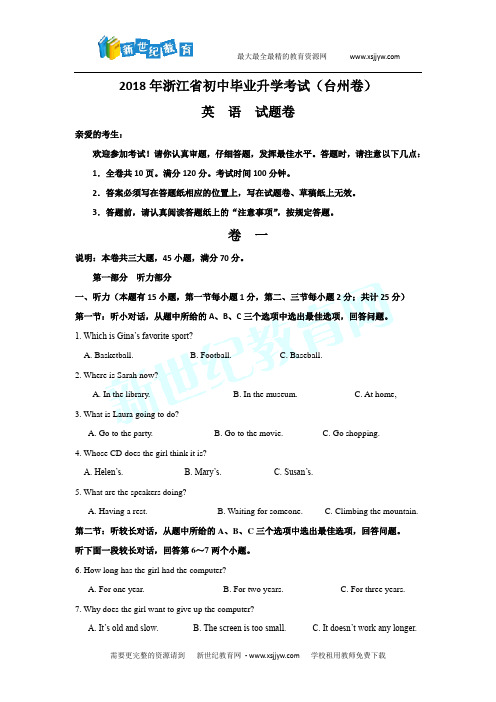
2018年浙江省初中毕业升学考试(台州卷)英语试题卷亲爱的考生:欢迎参加考试!请你认真审题,仔细答题,发挥最佳水平。
答题时,请注意以下几点:1.全卷共10页。
满分120分。
考试时间100分钟。
2.答案必须写在答题纸相应的位置上,写在试题卷、草稿纸上无效。
3.答题前,请认真阅读答题纸上的“注意事项”,按规定答题。
卷一说明:本卷共三大题,45小题,满分70分。
第一部分听力部分一、听力(本题有15小题,第一节每小题1分,第二、三节每小题2分;共计25分)第一节:听小对话,从题中所给的A、B、C三个选项中选出最佳选项,回答问题。
1. Which is Gina’s favorite sport?A. Basketball.B. Football.C. Baseball.2. Where is Sarah now?A. In the library.B. In the museum.C. At home,3. What is Laura going to do?A. Go to the party.B. Go to the movie.C. Go shopping.4. Whose CD does the girl think it is?A. Helen’s.B. Mary’s.C. Susan’s.5. What are the speakers doing?A. Having a rest.B. Waiting for someone.C. Climbing the mountain. 第二节:听较长对话,从题中所给的A、B、C三个选项中选出最佳选项,回答问题。
听下面一段较长对话,回答第6~7两个小题。
6. How long has the girl had the computer?A. For one year.B. For two years.C. For three years.7. Why does the girl want to give up the computer?A. It’s old and slow.B. The screen is too small.C. It doesn’t work any longer.听下面一段较长对话,回答第8~10三个小题。
往年浙江省杭州市中考英语真题及答案
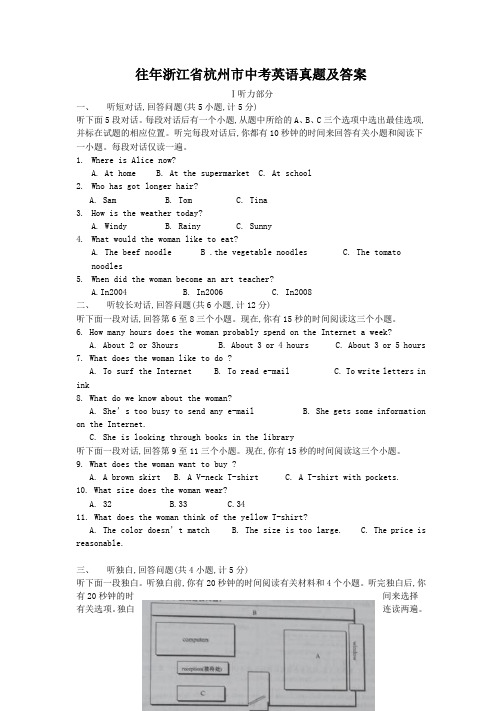
往年浙江省杭州市中考英语真题及答案Ⅰ听力部分一、听短对话,回答问题(共5小题,计5分)听下面5段对话。
每段对话后有一个小题,从题中所给的A、B、C三个选项中选出最佳选项,并标在试题的相应位置。
听完每段对话后,你都有10秒钟的时间来回答有关小题和阅读下一小题。
每段对话仅读一遍。
1.Where is Alice now?A. At homeB. At the supermarketC. At school2.Who has got longer hair?A. SamB. TomC. Tina3.How is the weather today?A. WindyB. RainyC. Sunny4.What would the woman like to eat?A. The beef noodle B .the vegetable noodles C. The tomatonoodles5.When did the woman become an art teacher?A.In2004B. In2006C. In2008二、听较长对话,回答问题(共6小题,计12分)听下面一段对话,回答第6至8三个小题。
现在,你有15秒的时间阅读这三个小题。
6. How many hours does the woman probably spend on the Internet a week?A. About 2 or 3hoursB. About 3 or 4 hoursC. About 3 or 5 hours7. What does the woman like to do ?A. To surf the InternetB. To read e-mailC. To write letters in ink8. What do we know about the woman?A. She’s too busy to send any e-mailB. She gets some information on the Internet.C. She is looking through books in the library听下面一段对话,回答第9至11三个小题。
2018-2019年浙江杭州中考完形填空
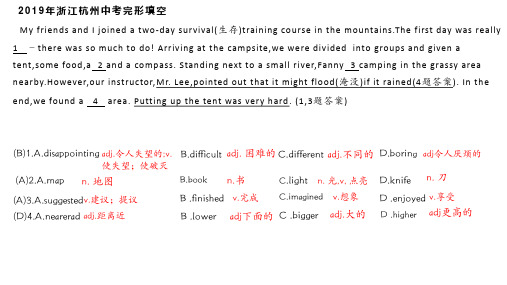
4.D考查形容词比较级辨析。A. nearer adv.距离不远;在附近adj.距离近;不远.B . lower adj下面的,下方 的v.把…放低;使…降下;v.变昏暗;变恶劣.adv.低;向下 C . bigger adv.更大adj.(体积、程度、数量等) 大的,巨大的.D . higher英 [ˈhaɪə(r)] adj.级别较高的;较重要的adv.在高处;向高处;根据后文“Mr Lee指出,如果下雨,我们建在草地边的帐篷会被淹掉。”可知,水往低处走,所以我们应建在更高的地方。
(C) 7. A.start v.开始
B.mind v.介意
C.stop v.停止
D.continue v.继续
(D)8. A.yet adv.然而
B.too adv.也
C.again adv.再一次
D.instead adv.代替
(A)9. A.helped out v.协助 B.gave out v.用完 C.worked out v.解决
9. A考查动词辨析。 根据上文可判断,意识到我们生火有麻烦时,他最终来帮忙了。A.help out意为“协助”; B.give out意为“用完”;C.work out 意为“解决;制定”;D.start out意为“开始;着手”。
10. B考查动名词辨析。 根据前文“我们被奇怪的声音吵醒”,所以Peter 跑出去看发生了什么。A. developing(develop) 意为“发展”;B . happening( happen)意为“发生”;C . beginning (begin) 意为“开始”;D . following( follow)意为“ 跟随”。
(B)15A.example n.实例;例证;例子
BB..etxhpemer第 动ien词三ce或人n介称.经词复验的数;宾代实语词践,;用经作历vC.C.y.oauct你用人iv;,i你直ty们接;称n与.呼活名某动词人及;形泛容指词任连何
2018年浙江杭州中考英语试卷(含解析)
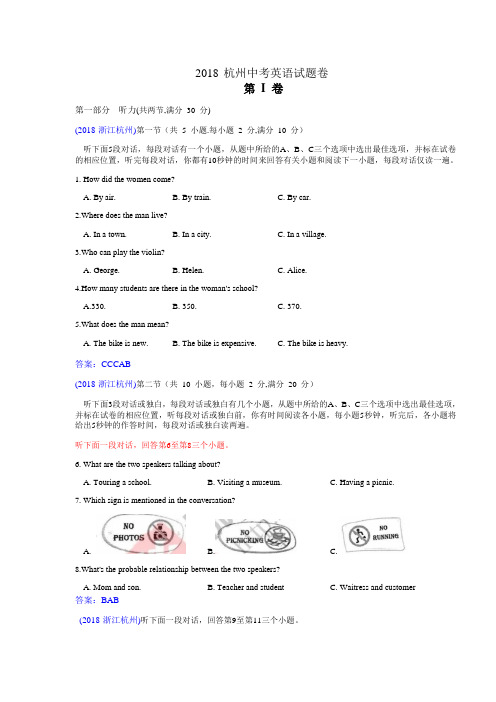
2018 杭州中考英语试题卷第I 卷第一部分听力(共两节,满分30 分)(2018·浙江杭州)第一节(共5 小题.每小题2 分,满分10 分)听下面5段对话,每段对话有一个小题,从题中所给的A、B、C三个选项中选出最佳选项,并标在试卷的相应位置,听完每段对话,你都有10秒钟的时间来回答有关小题和阅读下一小题,每段对话仅读一遍。
1. How did the women come?A. By air.B. By train.C. By car.2.Where does the man live?A. In a town.B. In a city.C. In a village.3.Who can play the violin?A. George.B. Helen.C. Alice.4.How many students are there in the woman's school?A.330.B. 350.C. 370.5.What does the man mean?A. The bike is new.B. The bike is expensive.C. The bike is heavy.答案:CCCAB(2018·浙江杭州)第二节(共10 小题,每小题2 分,满分20 分)听下面3段对话或独白,每段对话或独白有几个小题,从题中所给的A、B、C三个选项中选出最佳选项,并标在试卷的相应位置,听每段对话或独白前,你有时间阅读各小题,每小题5秒钟,听完后,各小题将给出5秒钟的作答时间,每段对话或独白读两遍。
听下面一段对话,回答第6至第8三个小题。
6. What are the two speakers talking about?A. Touring a school.B. Visiting a museum.C. Having a picnic.7. Which sign is mentioned in the conversation?A. B. C.8.What's the probable relationship between the two speakers?A. Mom and son.B. Teacher and studentC. Waitress and customer答案:BAB(2018·浙江杭州)听下面一段对话,回答第9至第11三个小题。
2018中考英语真题(附答案)
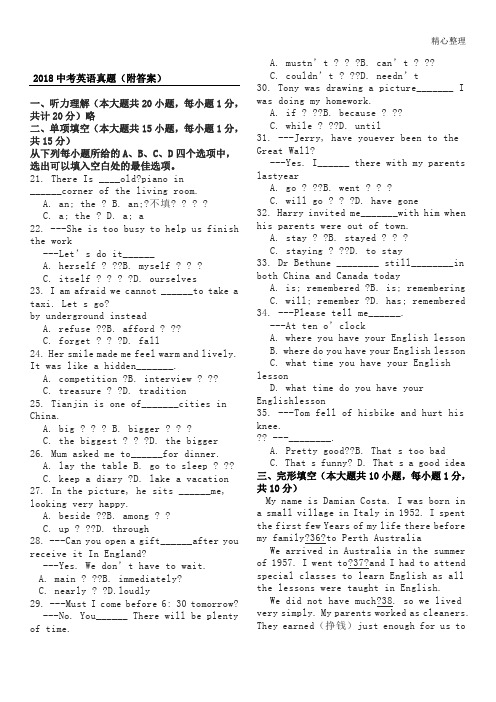
精心整理2018中考英语真题(附答案)一、听力理解(本大题共20小题,每小题1分,共计20分)略二、单项填空(本大题共15小题,每小题1分,共15分)从下列每小题所给的A 、B 、C 、D 四个选项中,选出可以填入空白处的最佳选项。
21. There Is ____old?piano in the work 24. Her China.A. beside ??B. among ? ?C. up ? ??D. through28. ---Can you open a gift______after you receive it In England?---Yes. We don ’t have to wait. A. main ? ??B. immediately? C. nearly ? ?D.loudly29. ---Must I come before 6: 30 tomorrow? ---No. You______ There will be plenty of time.A. mustn ’t ? ? ?B. can ’t ? ??C. couldn ’t ? ??D. needn ’t30. Tony was drawing a picture_______ I was doing my homework.A. if ? ??B. because ? ??C. while ? ??D. until31. ---Jerry, have youever been to the Great Wall?---Yes. I______ there with my parents lastyearA. go ? ??B. went ? ? ?lesson1分,a small village in Italy in 1952. I spent the first few Years of my life there before my family?36?to Perth AustraliaWe arrived in Australia in the summer of 1957. I went to?37?and I had to attend special classes to learn English as all the lessons were taught in English. We did not have much?38. so we lived very simply. My parents worked as cleaners. They earned (挣钱)just enough for us tosurvive (维持生活)and _39?a little money. My father had always wanted to?40?a small restaurant. Finally.?41?ten years of hard work, in June1967, he managed to save enough and opened our first pizzeria (比萨饼店).42?business was slow at first, it soon got better. I helped out at the pizzeria after school and at weekends. Just two years after we?43?my father decided that we needed a full-time waiter. Then heD arrive on the second of August. it's so exciting! We can meet each other soon! I will spend a day in Ocean Park on the thirdof August. I know that you ’ve visited Ocean Park many times before. Can yougive me some advice on what to see in Ocean Park?I would also like to visit you at your homeon the fourth of August. Are you free on that day? I ’ve bought a present foryou. I think you ’ll love it.By the way. would you like to go to Disneyland with me? I really want to takesome photos with you in Disneyland You knowI love the famous cartoon characters of Disney such as Snow White andMickeyMouse very much. I know you love them too.When can you go to Disneyland with me?Please let me know. I'll stay until the ninth of August and go back to England on that day.See you soon.Love, LilyPark? C. if Susan can meet her at the airport D. when Susan can go to Disney land withherBI did something wrong today.While at the beach this afternoon. I met aboy called Bob We talked a lot. He said that it was fun playing on the cliffs (悬崖).I told him that I was not allowed to go near that place( Mum and Dad had alwaystold me it was dangerous to play there). He called me a coward. I wantedtoprove to him that I was just as brave, so I agreed to go with himWe wanted to make our way down to explore (探索)thearea. so Bob started to climbdown and I followed him. Unluckily. some rockscame down after us. One of them nearly hit my head. We could not get back up.We shouted and shouted for help. but for a long time no help came. I was really scared. I wanted to cry. Then, we heard some sounds. Someone had heard us. Awoman tied (系Mywas54. Put the sentences inthe right order according to the passagea. Some rocks came downb. The writer followed Bobc. The writer wanted to cryd. A man and a woman saved theme. The writer and Bob heard some soundsA.a-b-c-d-cB.b-a-c-c-dC.a-c-b-c-dD.b-c-a-c-d55. How did the writerfeel about what he had done?A. Surprised?????B. Excited?????C. Glad????D. SorryCIn the 13th century. Marco Polo the world known Italian travelled saw many wonderful things in China. One of the thing she discovered was money made of paper. People in the West did not have such kind of money until the I5th century. However the Chinese began to use it in the 7th century.ago. Butcanwithsome dayour city.paper.nearly 48.000 trees everyday. The fact is that it takes more than 10 years for a tree to grow.So we must start saving paper right now. We can use both sides of every piece of paper. We can make useful things out of used paper. We can use china cups instead of paper ones. When shopping, we can use fewer paper bags and reuse them if we have someIn short, we should keep a balance (平衡)between using paper and protecting trees, and do it now before it is too late.56. When did the Chinesebegin to use paper money?A. In the 5th centum????B. In the 6th centuryC. In the 7ih centum????D. In the 15th century57. Why did Canadabecome an important country in paper making?A. Because it was a large country??????B. Because it had lots of forestsC. Because it was a very rich country ??D.trees?共5分)F. She's very tall.F Or she probably feels lonely without you.G But she's so diferent.A: Lingling, you look unhappy. what's up? B: Dad, I have a problem with my best friend. A: ??61 ? ?B: We 've been friends for five years. We went to different schools last term. And she came to study at my school this term. I was very happy at first .62 ? ? ??A: Can you tell me how she's different?B: She doesn't like me to see my other friends.A:?63 ? ? ??B: Yes, I have. But she refused to listen. A:64 ? ? ??B: No. I don't know.A:May be she doesn't feel sure ofherself.65 ? ??B: Maybe. What shall I do then?A: You can introduce her to your other friends and encourage her to join in more.2分,1分,共5分)?Albert?Einstein?(1879-1955)Early LifeAlbert Einstein was born on 14th March ,1879 in Germany. He was an extraordinary(非凡的) person since he was born. Einstein wasn't able to speak a word until three. He was curious(好奇的)and imaginative. He loved watching things carefully and asked a lot of questions about them. His questions were often hard to answer for teachers. SchoolingEinstein started school in 1885. Though he did well in maths and science. he failed in many subjects like history, geography and languages. He was not the teacher'sfavourite. He didn't enjoy going to school. Einstein finished high school in Switzerland and entered a university in Zurich . He graduated (大学毕业) as a teacher of maths and physics in1900. Scientific WorkAfter graduation, Einstein worked at the71. 72. ?八、共10根据短文内容及首字提示,填写所缺单词,使短文意思完整。
2018年中考英语试题精选专项练习_被动语态和时态(100题 带答案)
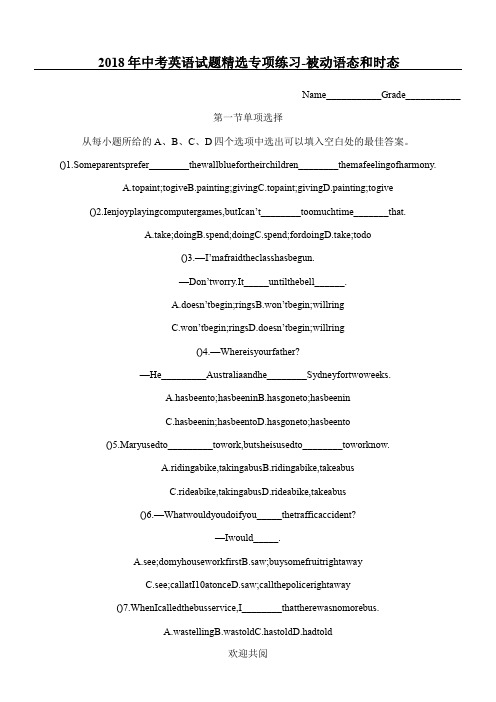
2018年中考英语试题精选专项练习-被动语态和时态Name___________Grade___________第一节单项选择从每小题所给的A、B、C、D四个选项中选出可以填入空白处的最佳答案。
()1.Someparentsprefer________thewallbluefortheirchildren________themafeelingofharmony.A.topaint;togiveB.painting;givingC.topaint;givingD.painting;togive()2.Ienjoyplayingcomputergames,butIcan’t________toomuchtime_______that.A.take;doingB.spend;doingC.spend;fordoingD.take;todo()3.—I’mafraidtheclasshasbegun.—Don’tworry.It_____untilthebell______.A.doesn’tbegin;ringsB.won’tbegin;willringC.won’tbegin;ringsD.doesn’tbegin;willring()4.—Whereisyourfather?—He_________Australiaandhe________Sydneyfortwoweeks.A.hasbeento;hasbeeninB.hasgoneto;hasbeeninC.hasbeenin;hasbeentoD.hasgoneto;hasbeento()5.Maryusedto_________towork,butsheisusedto________toworknow.A.ridingabike,takingabusB.ridingabike,takeabusC.rideabike,takingabusD.rideabike,takeabus()6.—Whatwouldyoudoifyou_____thetrafficaccident?—Iwould_____.A.see;domyhouseworkfirstB.saw;buysomefruitrightawayC.see;callatI10atonceD.saw;callthepolicerightaway()7.WhenIcalledthebusservice,I________thattherewasnomorebus.A.wastellingB.wastoldC.hastoldD.hadtold()8.IknowalittleaboutThailand,asItherethreeyearsago.A.havebeenB.havegoneC.willgoD.went()9.Theroomeveryday.Youcanliveinnow.A.cleansB.iscleaningC.iscleanedD.hascleaned()10.ThereportersaidthattheUFOeasttowestwhenhesawit.A.travelsB.traveledC.wastravelingD.hastraveled()11.—Whyareyouinsuchahurry,John?—ThereabasketballmatchbetweenClassThreeandourclassintenminutes.A.isgoingtobeB.isgoingtohaveC.willhaveD.willhold()12.—HaveyoueverbeentoSingapore?—Yes.Itherelastyearwithmyparents.A.goB.wentC.havebeenD.wasgoing()13.—IsTominthenextroom?—Well,it’shardtosay.ButIheardhimloudlywhenIpassedbyjustnow.A.speakB.tospeakC.spokenD.speaking()14.Inthepastfewyears,thousandsoffilmsallovertheworld.A.haveproducedB.havebeenproducedC.areproducingD.arebeingproduced()15.Wemustdoeverythingwecanourearthcleanerandsafer.A.madeB.tomakingC.makeD.tomake()16.—YouwerenotinwhenIwenttoyouyesterday.—Oh,I_____forafriendfromEnglandattheairportatthatmoment.A.hadwaitedB.waswaitingC.amwaitingD.havewaited()17.AliceinWonderland_____for15daysandmanyofuslikethefilmverymuch.A.beginsB.hasbegunC.beganD.hasbeenon()18.—Hello,Mary!ThisisJohn.YoumustknowwhyI______you.—Oh,hello,John!I’vewaitedforthiscallsincelastmonth.A.calledB.amcallingC.wascallingD.havecalled()19.Youneedtotakenotesatthemeetingsomakesure_______apenandsomepaperwithyou.A.bringB.bringingC.tobringD.notbring()20.—Hello,mum.AreyoustillonEmeiMountain?—Oh,no.wearebackhome.We________areallygoodjourney.A.haveB.hadC.arehavingD.willhave()21.—Oh,myGod!Ican’tfindmykeytotheoffice.—Don’tworry.Perhapsit_______atyourhome.A.leftB.hasleftC.wasleftD.hadleft()22.Dr.?Bethune?____?working?in?spite?of?cutting?his?hand?during?an?operation.?A.stopped??B.continued???C.forgot??D.enjoyed()23.Mum,?can?I?have?something?to?____?now??I'm?really?hungry!??A.do??e??C.eat??D.see()24.I?____?to?the?cinema.Would?you?like?to?come?with?me???A.go??B.am?goingC.have?gone??D.went()25.—Haven’tItoldyouthatyoushouldbehomeearlier?—Yes,butIhomeearlierthanIusuallydo.A.wascomingB.willcomeC.cameD.hadcome()26.It’sacustominChinatohavesometeaorotherdrinksbeforethemeal.A.servesB.servedC.isservedD.willbeserved()27.—Idon’tknowwhen______tom orrow?—Iwillcallyouassoonashe______.A.willhecome;arrivesB.hewillcome;arrivesC.hewillcome;willarriveD.willhecome;willarrive()28.—Iwon'thavetimetogoshoppingwithyouthisafternoon.—Butyou______meyesterday.A.orderedB.mentionedC.promisedD.knew()29.Nodecision_______aboutthatmatteryet.Wearestillconsideringit.A.hasbeenmadeB.hasmadeC.willbemadeD.willmake()30.—Whichdressdoyoulikebest,Madam?—Sorry,Ican’tdecide______now.A.tobuywhichoneB.buywhichoneC.whichonetobuyD.whichIshouldbuyit()31.—It’stoohot.Wouldyoumin dmy________thewindow?—_________.Doitasyoulike,please.A.toopen;OKB.opening;CertainlynotC.opening;OfcourseD.open;Goodidea()32.He_______hisclassmates.A.getalongwellwithB.getwellwithC.isgettingalongwellwithD.isgetwellwith()33.CaptainAlisonwill________atei ghto’clock,soweshallhaveplentyoftime.A.beginningB.setoutC.besetoutD.bebegun()34.Ifanyoneeverasksherhowoldsheis,shealwaysanswers,“Mydear,itmustbeterrible______!”A.grownupB.beinggrownupC.begrownupD.tobegrownup()35.Intheolddays,they_______inthefactoryfrommorningtoevening.A.weremadetoworkB.askedtoworkC.madetoworkD.wereaskedforwork()36.EveryyearI_________thegardencompetitiontoo,andIalwayswinalittleprizefortheworsegardeninthetown!A.enterB.enteredC.enteredforD.enterfor()37.OurEnglishteacherisverynice.We_____friendssincethreeyearsago.A.wereB.becameC.havebeenD.havemade()38.Hotwater_____inthestudents’flatsfrom5pmto7pmnow.A.suppliesB.issuppliedC.suppliedD.wassupplied()39.Jenny_____inthechickenwhenyoucalledherat5o’clockthisafternoon?A.iscookingB.wascookingC.cooksD.cooked()40.The30th OlympicGamesinJuly2012inLondon.A.isheldB.washeldC.willholdD.willbeheld()41.Ourteachertolduscarefullyinclass.A.listenB.tolistenC.listenedD.listens()42.ImyhomeworkassoonasIgethome.A.doB.didC.willdoD.amdoing()43.Listen!Someone________anEnglishsongnow.A.singsB.sangC.issingingD.wassinging()44.Judywithherbrother_______computergameswhenhermothercameback.A.wereplayingB.areplayingC.wasplayingD.isplaying()45.AfootballmatchbetweenClassTwoandClassThree________tomorrowafternoon.A.isheldB.washeldC.mustbeheldD.willbeheld()46.He_________hishometownfortwentyyears.Hereallymissesit!A.hasbeenawayfromB.leftC.hasleftD.isawayfrom()47.________somethingwrongwithmybike.CanIuseyours?A.ItisB.ItwasC.ThereisD.Therewas()48.Theclothingstore_______asale.Theclothesthereareverycheap.A.hasB.hadC.ishavingD.washaving()49.MissZhang,themostbeautifulteacher,_________manyflowersandlettersthesedays.A.receivedB.willreceiveC.wasreceivingD.hasreceived()50.Yoursweaterlookssmart.Where______you______it?A.do;getB.did;getC.will;getD.have;got()51.—Wherewereyouthismorning?—I______inthesupermarket.A.willshopB.amshoppingC.wasshoppingD.haveshopped()52.Moremoney_______whenweusebothsidesofpaper.A.willsaveB.wassavedC.hassavedD.willbesaved()53.—Canyouanswerthedoor,Jim?I________thedishes.—I'mcoming,dad.A.doB.didC.havedoneD.amdoing()54.—Whatsmellsterrible,Ted?—I'msorry.I'll_______myshoesandwashthematonce.A.takeawayB.putawayC.moveawayD.getaway()55.—HaveyouheardofEarthDay?—Yes.ThefirstEarthDay_________in1970toeducateustoprotectourplanet.A.celebratesB.celebratedC.iscelebratedD.wascelebrated()56.—I'dliketointroducemybestfriendtoyou,Peter.—Thankyou,Lucy.Butwe_________already.A.meetB.metC.willmeetD.havemet()57.—WhatdidYangYingsay?—Shesaidthey_____aschooltripthenextweekend.A.willhaveB.hadC.wouldhaveD.have()58.—Sandy,Icalledyouat9:00lastnight,butnobodyansweredthephone.—I'msorry.We_____abirthdayparty_____Jerry.A.had;withB.werehaving;forC.arehaving;forD.had;for()59.—Hey,Molly.You_____onthephonejustnow.Butyouweren'thereandthemanleftaphonenumber.—Oh?Iwasinthelibrary.A.wantedB.arewantedC.werewantedD.havewanted()60.—Whydon’tyoubuythecomputer?—It’stooexpensive.Ican’t_____it.A.affordB.sellC.borrowD.keep()61.—Haveyouwashedtheclothes?—Notyet.ButI_____theminhalfanhour.A.washedB.havewashedC.willwashD.wash()62.—Whywashelateforschoolyesterday?—Heoverslept.Bythetimehegottothebusstop,thebus_____already_____.A.was,leavingB.has,leftC.would,leaveD.had,left()63.—It’sdifficultforvillagechildrentocrosstherivert oschool.—Ithinkabridge_____overtheriver.A.shouldbebuiltB.willbuildC.isbuiltD.wasbuilt()64.Weknowthatsheenjoys______booksverymuch.A.readB.readsC.readingD.toread()65.MypenpalAndrewfounditdifficult______ChinesewellA.learningB.learnC.tolearnD.learned()66.Asoneoftheschoolrules,middleschoolstudentsarenot______tosmoke.A.orderedB.refusedC.allowedD.forbidden()67.OurforeignteacherMrGreen______usEnglishsincethreeyearsago.A.hastaughtB.isteachingC.taughtD.teaches()68.—Whydoyouwanttostayathome?—BecauseI______goodwhenIamwithmyfamily.A.smeltB.feelC.tasteD.sound()69.—Yourpaintingsaresogreat,David!Whendidyoulearn______?—Threeyearsago.A.tomeetB.toswimC.topaintD.tosing()70.—DoyouknowTom?—Sure,wehave______inthesamevillageformanyyears.A.leftB.livedeD.gone()71.Kevinwillgivelesshomeworktohisstudentsifhe______ateacher.A.becomesB.becomeC.becameD.becoming()72.—Sorry,MrGreen.Ihave_______myhomeworkathome.—Nevermind.Butdon'tforgernexttime.A.putB.keptC.leftD.remained()73.—Willyougoandseethemovie NetMother withme?—Thankyou.ButI_____italready.A.sawB.haveseenC.seeD.willsee()74.—DoyouknowtheEnglishman?—Yes.I_____________himfortwoyears.A.gettoknowB.haveknownC.knewD.gottoknow()75.Travelingtospaceisnolongerjustadream.Russia______thefirsthotelinspaceinthenearfuture.AbuildsB.willbuildC.buildDhasbuild()76.Chinaplanstolettourists_____theXishaislandsinthesouthChinaSeathisyear.A.visitB.visitsC.visitingD.visited()77.It_____MrGreenanhourtofixuphisbicycleyesterday.A.costB.paidC.spentD.took()78.Everyyear,morethan70,000,000sharks____fortheirfins.A.werekilledB.havekilledC.arekilledD.willkilled()79.—IwantatickettoShanghaithisafternoon,please.—OK.Willyouplease______meyourIDcard?A.tellB.serveC.sendD.show()80.—IhearMr.ZhanghasgonetoBeijingforameeting.—Really?Doyouknowwhenhe______?A.leavesB.wasleavingC.hasleftD.left()81.—Mum,whencanIwatchTV?—Assoonasyourhomework_______.A.finishB.finishedC.isfinishedD.willbefinished()82.Don’t________sooften.It’sbadforyourhealth.A.getupB.stayupC.lookupeup()83.—Guesswhat!IsawSallyinLondon.—Really?I________shewasinNewYork.A.thinkB.wasthinkingC.thoughtD.amthinking()84.Girlstudentsinsomeschoolsarenotallowed________longhair.A.havingB.haveC.hadD.tohave()85.—Doesthesoup________nice?—Yes.It’shot,butreallydelicious.A.soundB.feelC.lookD.taste()86.ThesmileonMother’sfacesuggestedshe_____.A.wasgladB.wassurprisedC.ispleasedD.wasannoyed()87.Thewoman_____allofhermoneytocharities_____thepoor.A.gaveoff,tohelpB.gaveup,helpingC.gaveaway,tohelpD.gave,helping()88.Inrecentyears,theeconomyofourcountry_____rapidlyA.isincreasedB.hasincreasedC.increasedD.hasbeenincreased()89.—Iphonedyouat7:00thismorning.Buttherewasnoanswer.—Well,maybeI______morningexercisesatthattime.A.wasdoingB.did CisdoingD.woulddo()90.InEnglandwehaveasaying:It’sthethoughtthat_______.A.mindsB.countsC.needsD.sounds()91.Thesportofbasketball_______bymorethan100millionpeopleinover200countries.A.isshortB.ismadeC.isplayedD.istaught()92.Iwanttowriteforinternational______tobecomeawriter.A.chairsputersC.doorsD.magazines()93.—Sam,comedownstairs,please.Ineedyourhelp.—Sorry,Mum.I_______onthephone.A.amtalkingB.talkedC.wastalkingD.havetalked()94.Anewclub_____inourschoolatthebeginningofthisyearandnowithasmanymembers.A.startsB.isstartedC.hasstartedD.wasstarted()dyGagaisverypopular,andshebymanyboysandgirlsatschool.A.lovesB.islovingC.islovedD.tolove()96.—Dad,whyshouldIstop______computergames?—Foryourhealth,myboy.A.toplayB.playingC.playD.played()97.—Jane,yourbedroomissodirty.—Sorry,I’ll________.A.cleanupitB.cleanitupC.cleanthemupD.cleanupthem()98.—Whydon’tyougotothemoviewithme,Betty?—BecauseI______itbefore.A.sawB.haveseenC.seeD.seeing()99.—Ourhometownisbecomingmoreandmorebeautiful.—Sure.Manytrees_______everyyear.A.plantB.isplantedC.areD.planted()100.—Peterhaschangedalot,hasn’the?—Yes.Heusedtotheguitar,butnowheismoreinplayingsoccer. A.plays;interestedB.play;interestedC.play;interestingD.playing;interest2018年中考英语试题精选专项练习-被动语态和时态参考答案1-5ABCBC6-10DBDCC11-15ABDBD16-20BDBCB21-25CBCDC26-30CBCAC31-35BCBDA36-40DCBBD41-45BCACD46-50ACCDB51-55CDDAD56-60DCBCA61-65CDACC66-70CABCB71-75ACBBB76-80ADCDD81-85CBCDD86-90ACBAB91-95CDADC96-100BBBCB。
- 1、下载文档前请自行甄别文档内容的完整性,平台不提供额外的编辑、内容补充、找答案等附加服务。
- 2、"仅部分预览"的文档,不可在线预览部分如存在完整性等问题,可反馈申请退款(可完整预览的文档不适用该条件!)。
- 3、如文档侵犯您的权益,请联系客服反馈,我们会尽快为您处理(人工客服工作时间:9:00-18:30)。
第Ⅰ卷第一部分听力(共两节,满分30分第一节(共5小题,每小题2分,满分10分)听下面5段对话。
每段对话后有一个小题。
从题中所给的A、B、C三个选项中选出最佳选项,并标在试卷的相应位置。
听完每段对话后,你都有10秒钟的时间来回答有关小题和阅读下一小题。
每段对话仅读一遍。
1. How did the woman come?A. By air.B. By train.C. By car.2. Where does the man live?A. In a town.B. In a city.C. In a village.3. Who can play the violin?A. George.B. Helen.C. Alice.4. How many students are there in the woman’s school?A. 330B. 350C. 3705. What does the man mean?A. The bike is new.B. The bike is expensive.C. The bike is heavy.第二节(共10小题,每小题2分,满分20分)听下面3段对话或独白。
每段对话或独白后有几个小题,从题中所给的A、B、C三个选项中选出最佳选项,并标在试卷的相应位置。
听每段对话或独白前,你有时间阅读各小题,每小题5秒钟。
听完后,各小题将给出5秒钟的作答时间。
每段对话或独白读两遍。
听下面一段对话,回答第6至第8三个小题。
6. What are the two speakers talking about?A. Touring a school.B. Visiting a museum.C. Having a picnic.7. Which sign is mentioned in the conversation?8. What's the probable relationship between the two speakers?A. Mom and son.B. Teacher and student.C. Waitress and customer.听下面一段对话,回答第9至第11三个小题。
9. What is the woman?A. A restaurant owner.B. An interviewer.C. A cafe waitress.10. When do people in New York usually go to restaurants?A. Between 5 and 6 p. m.B. Between 7 and 8: 30 p. m.C. Between 8 and 9 p. m.11. Which restaurants are getting popular with people in London?A. Indian restaurants.B. South American restaurants.C. Italian restaurants.听下面一段独白,回答第12至第15四个小题12. How many days does the speaker work every week?A. Five.B. Six.C. Seven.13. Why does the speaker often eat a big lunch?A. He is very hungry.B. He is too busy for dinner.C. He really likes the food.14. What does the speaker often do to relax at night?A. Listen to music.B. Watch movies.C. Go shopping.15. What does the speaker think of his group members?A. Lonely but successful.B. Famous and professional.C. Hardworking and friendly.第二部分阅读理解(共两节,满分40分)第一节(共15小题,每小题2分,满分30分)阅读下列短文,从每题所给的四个选项(A、B、C和D)中选出最佳选项。
AWhen Canadian teenager Ryan was six years old, his teacher told him that many parts of Africa, there was no clean water. She said that people often made themselves ill, and even died, just from drinking or bathing in dirty water.What she said made Ryan upset. He decided to raise money for a well(井) so that people in Africa could have clean water. He did extra chores for his parents and raised $ 70 all by himself. Then he found out that it actually cost $2,000 to dig a well.Most people would have given up at this point, but not Ryan. He was disappointed, but determined to raise more money. Finally he collected over S 2,000. Th at money was used to dig the first of "Ryan’s wells".Since then, Ryan has continued to raise money for more wells. In fact, Ryan has raised over $1,500,000!Ryan calls himself “a normal boy" and likes to play ice hockey when he's not in school or travelling around the world talking to other students about himself and his work. As for the future, he has said that he isn't exactly sure what he will choose to do. "Something along the lines of a lawyer or a teacher. Maybe a leader!"16. Ryan’s teacher told him about the water problem in Africa in order to _______.A. encourage Ryan to dig wells for people in AfricaB. ask Ryan to raise money for poor people in AfricaC. make Ryan feel unhappy and disappointedD. educate Ryan to care about African people in difficulty17. What does Ryan think of himself according to the passage?A. He is different from other students in many ways.B. He never gives up when he has decided to do something.C. He is talented and can do many great things in the future.D. He's like other students with his own hobby and dreams.18. Which of the following is the best title for the passage?A. Ryan and His TeacherB. Ryan and His WellsC. Ryan and His MoneyD. Ryan and His FutureBWho wants to eat food that is thrown away as waste? Believe it or not, that’s exactly what world leaders did at a lunch held by the United Nations in 2015.During the meal, the world leaders enjoyed dishes like salads and burgers made with thrown-away vegetables and fruits. Chef Dan Barber, who helped create the meal, hoped that the experience would make the leaders pay more attention to the issue of food waste.It is a huge problem. One out of nine people on Earth does not get enough food. Yet every year over one third of the food produced worldwide goes to waste!Why is so much food wasted? Firstly, food is often thrown away before it reaches customers because too much of it is produced, or because it is not kept properly in farms. Secondly, shops and supermarkets usually throw away unsold food. Finally, customers often buy more food than they need, so a lot of uneaten food is wasted.How can you waste less food? When eating out, you may ask for less food and take home what is left. Visit fast food restaurants less often, since they are usually more wasteful. Encourage your favorite restaurants to give unsold food to food banks.You can also waste less food at home. Use smaller rice bowls so that you serve less rice. Encourage family members to use unfinished rice to make rice puddings. Tell family members to make a shopping list and buy only what is on the list when shopping for food.Food waste is a growing problem and we, either farmers or food sellers or customers, must take this problem more seriously and do what we can to help.19. What did world leaders do at a lunch held by the United Nations in 2015?A. They threw away food as waste during the meal.B. They made dishes with waste vegetables and fruitsC. They ate food made with waste vegetables and fruits.D. They helped Chef Dan Barber create the special meal.20. The underlined word "issue" in Paragraph 2 is closest in meaning to ________.A. resultB. problemC. causeD. beginning21. The writer organizes Paragraph 4 by asking a question and ______.A. giving examplesB. using numbersC. listing reasonsD. telling a story22. Which way of wasting less food is mentioned in the passage?A. Buying unsold food from supermarkets.B. Keeping food properly in a fridge.C. Using smaller rice bowls when eating out.D. Asking for less food in restaurants.CBananas are the perfect snack. Not only are they sweet and delicious, but they are easy to carry around, so you can take them anywhere. Best of all, bananas provide different things that the human body needs!Bananas grow best in warm places that get lots of rain. They grow on plants that look like trees. The banana plant, however, is considered a herb rather than a tree because it doesn’t have a strong, woody stem (干、茎). The plants can grow as high as 30 feet. When they reach their full height, flowers grow out from the stem. These flowers produce bananas.Two or three times each year, the plants produce fruit. The bananas grow together, which seem like "hands". A hand is made up of 10 to 20 bananas. Growers sometimes call bananas "fingers". Each bunch (丛) of bananas has about 15 hands, and so a whole bunch may have as many as 200 bananas and can weigh more than 100 pounds.After about three months, the bananas are ready to be picked. At this point, they still aren't the sunny yellow color of: b ananas. Farmers pick them when they’re green. That's how they're shipped to stores. They turn yellow along the way and are ready to be sold.If you love bananas, you've got a lot of company. Americans have been enjoying bananas since the first shipment arrived in the United States in 1876. Today Americans eat more bananas than any other fruit. More bananas are sold than apples and grapes together. Every American eats over 26 pounds of bananas each year!23. The first paragraph mainly talks about ______.A. why people like bananasB. how bananas tasteC. what bananas are rich inD. where bananas are taken24. What is the correct order in which these happen?a. The bananas begin to turn yellow.b. A banana plant grows to full height.c. The flowers produce bananas.d. The bananas are ready to be picked.A. c-b-a-dB. b-c-d-aC. b-c-a-dD. c-b-d-a25. Which of the following is true according to the passage?A. The banana plant is a kind of tree.B. Bananas like growing in hot and dry areas.C. One bunch of bananas may weigh over 100 pounds.D. The banana plant usually produces fruit once a year.26. Which is the second most popular fruit in America according to the bar chart?A. Apples.B. Grapes.C. Bananas.D. Oranges.DThere is a popular Chinese saying that “Fair skin (皮肤) will make up for three flaws(缺陷)”. This mentions the fact that in Chinese culture, it is believed that people who have fair skin are more beautiful. In Western culture, however, the opposite is true---many Westerners think tanned skin is prettier. The example shows that different cultures have different ideas of what they think is beautiful. These cultural meanings of beauty, however, are no longer important, As more and more people travel overseas, ideas about beauty are being shared among cultures. The Internet has also made it easier for people to share different types of beauty since people are always posting pictures on social media. The result is an ever-changing idea of what is considered beautiful.The cultural practice of ear piercings, for example, has become a part of modern day culture. In Kenya, it is a tradition among the Masai men and women to pierce and then make their ear lobes (耳垂) longer using ivory and wood or stones. They then wear colorful things on their ear lobes. This is a common practice since longer ear lobes are seen as a sign of beauty. This tradition has now found its way into present-day culture. Nowadays, this might still seem unusual to some, but with more and more well-known actors and film stars showing off their longer earlobes. It will finally become more fashionable.It is understood that different cultures around the world have different ways of showing beauty. However, since we now live in a worldwide society, people's views about beauty are always changing. With the help of the Internet, people are now able to easily borrow ideas from other cultures to help them stand out. So what new fashions can we expect to see in the future?27. What has made it easier for people to share ideas about beauty?A. The development of technology.B. The popularity of the latest fashions.C. The unchanged cultural traditions.D. The worlds growing population.28. What can be learned about the Masai people from the passage?A. Longer ear lobes are their new fashion.B. Only women make their ear lobes longer.C. They think longer ear lobes look beautiful.D. They make actors and film stars famous.29. The underlined word "them" in the last paragraph refers to _______ .A. peopleB. ideasC. culturesD. fashions30. What is the passage mainly about?A. People in Asian countries like fair skin better.B. Beauty is considered important in many cultures.C. Different cultures have different ideas about beauty.D. People's ideas about beauty are changing all the time.第二节(共5小题,每小题2分,满分10分)下面文章中有五处(第31-35题)需要添加小标题。
